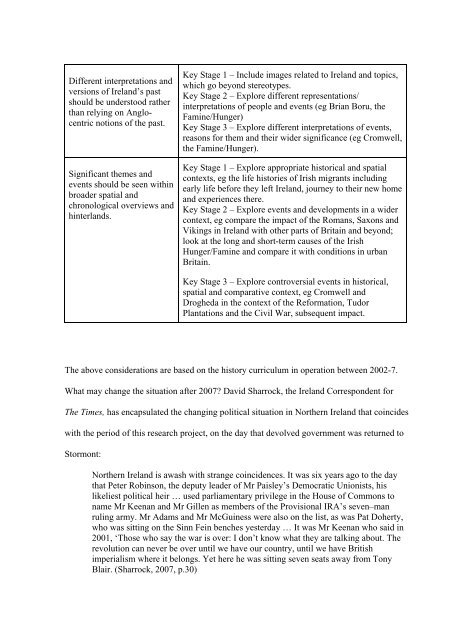View - eTheses Repository - University of Birmingham
View - eTheses Repository - University of Birmingham
View - eTheses Repository - University of Birmingham
You also want an ePaper? Increase the reach of your titles
YUMPU automatically turns print PDFs into web optimized ePapers that Google loves.
Different interpretations and<br />
versions <strong>of</strong> Ireland’s past<br />
should be understood rather<br />
than relying on Anglocentric<br />
notions <strong>of</strong> the past.<br />
Significant themes and<br />
events should be seen within<br />
broader spatial and<br />
chronological overviews and<br />
hinterlands.<br />
Key Stage 1 – Include images related to Ireland and topics,<br />
which go beyond stereotypes.<br />
Key Stage 2 – Explore different representations/<br />
interpretations <strong>of</strong> people and events (eg Brian Boru, the<br />
Famine/Hunger)<br />
Key Stage 3 – Explore different interpretations <strong>of</strong> events,<br />
reasons for them and their wider significance (eg Cromwell,<br />
the Famine/Hunger).<br />
Key Stage 1 – Explore appropriate historical and spatial<br />
contexts, eg the life histories <strong>of</strong> Irish migrants including<br />
early life before they left Ireland, journey to their new home<br />
and experiences there.<br />
Key Stage 2 – Explore events and developments in a wider<br />
context, eg compare the impact <strong>of</strong> the Romans, Saxons and<br />
Vikings in Ireland with other parts <strong>of</strong> Britain and beyond;<br />
look at the long and short-term causes <strong>of</strong> the Irish<br />
Hunger/Famine and compare it with conditions in urban<br />
Britain.<br />
Key Stage 3 – Explore controversial events in historical,<br />
spatial and comparative context, eg Cromwell and<br />
Drogheda in the context <strong>of</strong> the Reformation, Tudor<br />
Plantations and the Civil War, subsequent impact.<br />
The above considerations are based on the history curriculum in operation between 2002-7.<br />
What may change the situation after 2007? David Sharrock, the Ireland Correspondent for<br />
The Times, has encapsulated the changing political situation in Northern Ireland that coincides<br />
with the period <strong>of</strong> this research project, on the day that devolved government was returned to<br />
Stormont:<br />
Northern Ireland is awash with strange coincidences. It was six years ago to the day<br />
that Peter Robinson, the deputy leader <strong>of</strong> Mr Paisley’s Democratic Unionists, his<br />
likeliest political heir … used parliamentary privilege in the House <strong>of</strong> Commons to<br />
name Mr Keenan and Mr Gillen as members <strong>of</strong> the Provisional IRA’s seven–man<br />
ruling army. Mr Adams and Mr McGuiness were also on the list, as was Pat Doherty,<br />
who was sitting on the Sinn Fein benches yesterday … It was Mr Keenan who said in<br />
2001, ‘Those who say the war is over: I don’t know what they are talking about. The<br />
revolution can never be over until we have our country, until we have British<br />
imperialism where it belongs. Yet here he was sitting seven seats away from Tony<br />
Blair. (Sharrock, 2007, p.30)
















